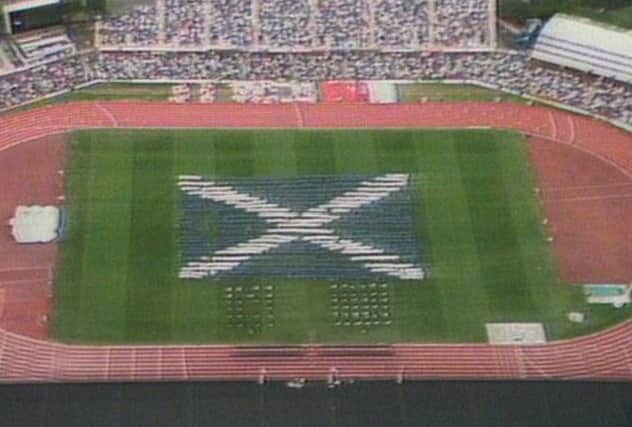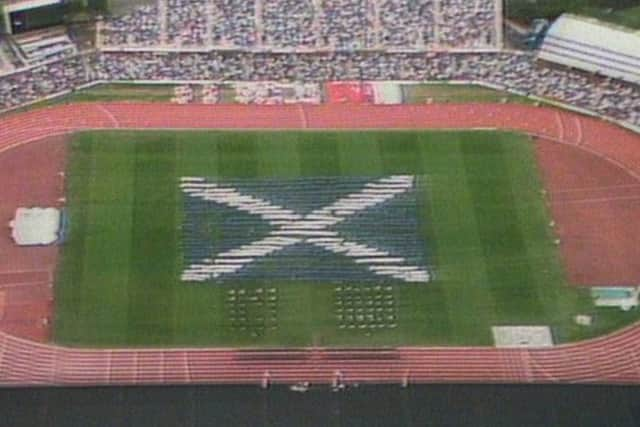Lost Edinburgh: 1986 Commonwealth Games


Organisers at the 2014 Glasgow Commonwealth Games will be dearly hoping that events run a little smoother than the last time the Games visited Scotland. The XIII Commonwealth Games almost never took place at all.
High Hopes
Edinburgh had done such a wonderful job at staging the 1970 event, that it is often viewed as the most successful Commonwealth Games ever. 42 nations and 1,700 athletes competed in what would be by far the biggest Games yet. The 1970 Commonwealth Games looked to the future as they became the first to ditch mention of the British Empire, in accordance with the shift from imperial to metric units. It was also the first to feature photo-finish technology. Dubbed ‘the Friendly Games’, Edinburgh 1970 was a resounding success. There were high hopes that the good-natured atmosphere could be replicated when the city was chosen as host once more just 16 years later.


1986 bid
Advertisement
Hide AdEdinburgh practically received the 1986 Games by default. There was no frantic bidding war like there is today. No other city had wanted them. Only Edinburgh, which still boasted much of its Games infrastructure from 16 years before seemed remotely keen to take on the financial gamble of hosting the ‘unlucky’ XIII event.
The city felt well prepared to host the games again. Venues such as the purpose-built Commonwealth Pool (which will feature diving events for Glasgow 2014) and Meadowbank Stadium, commissioned for the previous Games, were still relatively new. Nobody could do it more cheaply than Edinburgh, but the final cost of £17 million, a figure five times higher than in 1970, ultimately proved hard to come by.
Boycott
From 59 potential nations, only 27 would participate in Edinburgh. A mass boycott was staged as a reaction to the Thatcher government’s refusal to impose sanctions on South Africa’s apartheid administration. The politically-charged boycott dealt a devastating blow to the city of Edinburgh and the Games’ Organising Committee, who were now facing a hefty financial black hole due to the loss of much of the expected broadcasting and advertising revenue. The boycott received much of its support from nations in Africa, Asia and the Caribbean. The notable absence of ethnic diversity at the 1986 Games was a major embarrassment in the modern era. It would also be the lowest turnout of athletes since the 1950 event.
The Tory government rejected the desperate pleas from the Games Committee to help ease the now insurmountable running costs. To try and prevent huge losses, Daily Mirror owner, Robert Maxwell, stepped in as chairman with a promise to rescue the Games by injecting £2 million. Maxwell would part with barely £250,000. The 1986 Games would face a crippling deficit of £4.9 million. Edinburgh was making headlines across the world for all the wrong reasons - and the Games hadn’t even started.
Going for gold
Nearly three decades on, the 1986 Commonwealth Games are looked back upon with a degree of fondness by many Scots, while for others they still leave a bitter taste.
Boycotts, financial meltdown and the infamous torrential rain aside, most prefer to focus on the positives, such as the stunning performance from Liz McColgan (then Lynch) when she raced to gold in the Women’s 10,000m on the final day. Team Scotland finished 1986 with three golds, from a total medal haul of 33.
Advertisement
Hide AdThere is a school of thought which claims that Edinburgh may have saved the Games by refusing to cancel them, despite being faced with such horrendous logistic and economic difficulties. If not for the defiance of the Organising Committee, the Commonwealth Games may have been a thing of the past.
Edinburgh helped to define the modern Commonwealth Games in 1970, while 1986 saw the city work hard to preserve them for the years ahead - something to mull over as we sit down to enjoy Glasgow 2014 over the next couple of weeks.